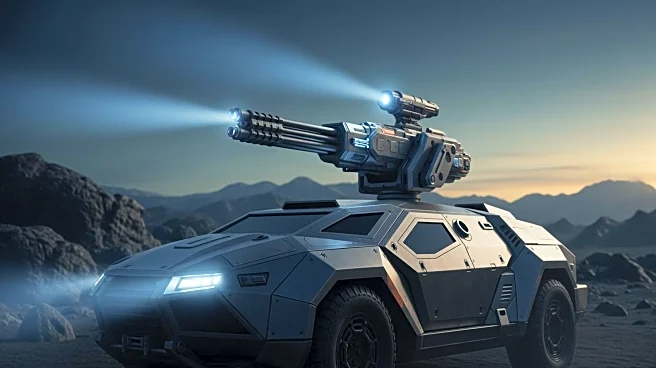What's Happening?
The latest installment in the Predator franchise, 'Predator: Badlands,' directed by Dan Trachtenberg, presents a fresh narrative by positioning a Predator as the central hero. The film, set to release on November 7, follows Dek, a Predator considered
weak by his clan, as he embarks on a mission to prove his worth. The story unfolds on the Yautja's home planet, where Dek, portrayed by Dimitrius Schuster-Koloamatangi, must hunt the fabled Kalisk on the dangerous 'Death Planet.' The film combines action with comedic and emotional elements, featuring Elle Fanning as Thia, a Weyland-Yutani robot who allies with Dek. The movie maintains the franchise's hallmark of intense action while exploring new cultural and familial aspects of the Yautja.
Why It's Important?
This film marks a significant shift in the Predator series by focusing on a Predator as the protagonist, offering a new perspective on the franchise's traditional narrative. By exploring the Yautja culture and family dynamics, the movie adds depth to the alien species, potentially broadening the franchise's appeal. The inclusion of comedic and emotional elements alongside the action may attract a wider audience, including those who appreciate character-driven stories. This approach could influence future sci-fi films to explore more complex narratives within established franchises, impacting how such stories are told and received.
What's Next?
As 'Predator: Badlands' hits theaters, its reception will likely influence the direction of future installments in the franchise. Positive audience and critical response could encourage filmmakers to continue exploring unconventional narratives within the Predator universe. Additionally, the film's success may prompt other franchises to innovate by focusing on character development and cultural exploration. The movie's performance at the box office will also be closely watched, as it could impact the production of similar genre films.
Beyond the Headlines
The film's exploration of Yautja culture and family dynamics introduces ethical and cultural dimensions to the Predator franchise. By humanizing the Predators, the movie challenges traditional perceptions of the species as mere antagonists. This shift could lead to discussions about the portrayal of 'monstrous' characters in media and the potential for empathy and understanding in storytelling. The film's narrative may also inspire other creators to delve into the backstories and cultures of non-human characters, enriching the sci-fi genre.















